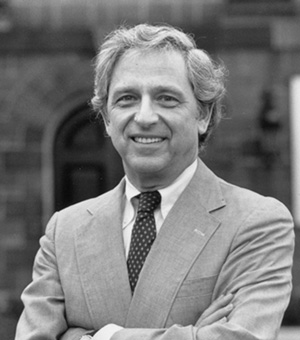Edward J. Bloustein
Rutgers President, 1971 to 1989

Edward J. Bloustein (1925–1989) was born in New York City, graduated from James Monroe High School in the Bronx in 1942, and entered the U.S. Army one year later. Discharged in 1946, he entered Washington Square College of New York University on a full scholarship and graduated Phi Beta Kappa in 1948. He traveled to Oxford University as a Fulbright scholar and received a bachelor of philosophy degree in 1950 with a thesis entitled “Is Epistemology a Logical, Psychological or Sociological Study?” Returning to the United States, he taught philosophy briefly at Brooklyn College and spent close to a year in Washington, D.C., with the Office of Intelligence in the State Department, where he served as a political analyst, specializing in Marxist theory and international political movements in the German Democratic Republic.
In 1951 Bloustein went to Cornell for a doctorate in philosophy, which was awarded in 1954. While living in Ithaca, he again contracted to work as a political analyst for the State Department before entering the Cornell Law School, where he served as editor-in-chief of the Cornell Law Quarterly and graduated with an LL.B. in 1959. Bloustein began his professional career as a law clerk to Judge Stanley H. Fuld of the New York State Court of Appeals, serving from 1959 to 1961. He then joined the faculty of the New York University Law School as an assistant professor, elevating to full professor in 1964. He moved to Vermont in 1965 when he was named president of Bennington College. Six years later, with the retirement of Mason Gross in 1971, he was elected president of Rutgers.
The Bloustein presidency was one of significant achievements for Rutgers. In 1972 Rutgers College became coeducational. One year later the university made a commitment to “big time” sports. In 1978 efforts were begun to reorganize the New Brunswick faculty into a unified Faculty of Arts and Sciences, which was accomplished in 1980. In 1981 a mission statement was approved that provided a blueprint for future planning and development of the university.
Under Edward J. Bloustein, Rutgers achieved distinction as one of the major public research universities in the nation.
During the 1980s, the university established the Fund for Distinction, a combination of private giving, and state and federal support, that helped finance science and technology centers on the Busch Campus. The fund was given a boost when New Jersey voters approved a $90 million Jobs, Science and Technology Bond issue in 1984 and again in 1988 with the $350 million Jobs, Education, and Competitiveness Bond issue.
By 1989, Rutgers had become an “institutional goliath” with over 47,000 students enrolled in programs offered in three cities. The total budget had reached over $600 million and academic standards had risen substantially over the years.
Rutgers, under the leadership of Edward Bloustein, enjoyed the benefits of a healthy economy and a governor who gave strong support to the mission of the university. The president fostered a close relationship with state and federal officials and persistently promoted Rutgers. He was a tireless fundraiser who became personally involved in helping the university reach its projected goal of $125 million during the Campaign for Rutgers shortly before his untimely death on December 9, 1989.
This biographical sketch was authored by Thomas J. Frusciano, Rutgers University Archivist. It originally appeared in The Journal of the Rutgers University Libraries.

